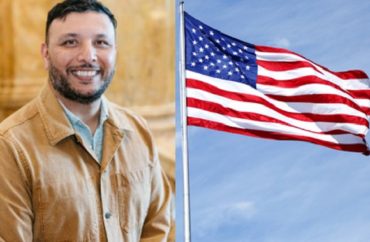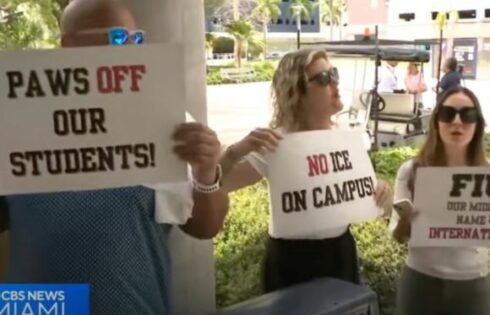
Black NPR host blames ‘growth in extremism post-Trump-presidency,’ for racial minority discomfort with American flag
A Marquette University professor says he gets “anxious” when he sees an American flag.
Philosophy Professor Grant Silva made the comments for a Flag Day segment yesterday on WUWM, a National Public Radio affiliate in Milwaukee.
Professor Silva (pictured) agreed with host Teran Powell when she discussed “the anxiety [Powell] had surrounded by excessive American Flags.”
“For example, I’m Black American, and over the past few years, I’ve continued to analyze what the American Flag means to me,” Powell said. “Especially considering the growth in extremism post-Trump-presidency and those extremists using the American Flag against people of color to say they’re the real Americans.”
She shared her own anxiety about seeing American flags in Illinois when she was traveling with a friend. “And both of us were like, ‘Yeah, we need to hurry up and leave. And I thought about it like, ‘why did we feel like that?”
“Black people for generations have dealt with tension with the American flag,” Powell said in her write-up of the interview. “Our feelings were nothing new. But I asked Silva what he thought and he says he’s had similar experiences.”
“I also get a little bit anxious around the excessive imagery of the flag in part because in my experience, patriotism quickly slips into nationalism,” Silva told the NPR affiliate. “Especially the simplistic version of patriotism, the flag waving, my country love it or leave it kind of attitude. That is just a hop, skip and a jump away from becoming nationalism.”
He continued:
As much as I would like to see the flag displayed in a proud manner, it all too quickly takes on the stakes that, as a non-white person, can mean a lot, right? It can mean a sense of inclusion or exclusion. A sense of belonging or the ascription of perpetual foreigner, perpetual outsider status; that that flag is not for me unless I’m willing to abide by the assimilatory paradigm that some of these individuals that you’re talking about tend to put forward.
He compared the experience of seeing American flags to how he felt when he saw “Immigrant Hunting License” stickers for sale.
The philosophy scholar lamented how he felt the need to assimilate to belong in America.
“It wasn’t the color line that was causing this difference, right, but it was the imagery of the border. And so we see the border when we see certain individuals that don’t fit the meaning of what it means to be an American,” Silva said.”And so, for me, it was those ascriptions of difference that I continuously had throughout my childhood and early days of adulthood that kind of reinforced this perspective that, well, in order to belong here, I would have to pay the price in a sense, I would have to assimilate.”
The philosopher has an academic interest in racism.
“Grant is currently working on a monograph entitled Racism as Self-Love in which he explores the egoist motivations at the core of racist activity,” according to his university bio. “This book-project brings together recent publications on anti-immigrant sentiment and the militarization of borders with new work on the nature of moral responsibility for racism.”
His academic interests come from the “1992 Rodney King L.A. Riots” which “ignit[ed] a profound concern with racism, material and economic inequality, and the power of ideas.”
MORE: Pitzer College student calls the flag a ‘symbol of hatred’
IMAGES: Marquette University;Leonard Zhukovsky/Shutterstock
Like The College Fix on Facebook / Follow us on Twitter





Please join the conversation about our stories on Facebook, Twitter, Instagram, Reddit, MeWe, Rumble, Gab, Minds and Gettr.